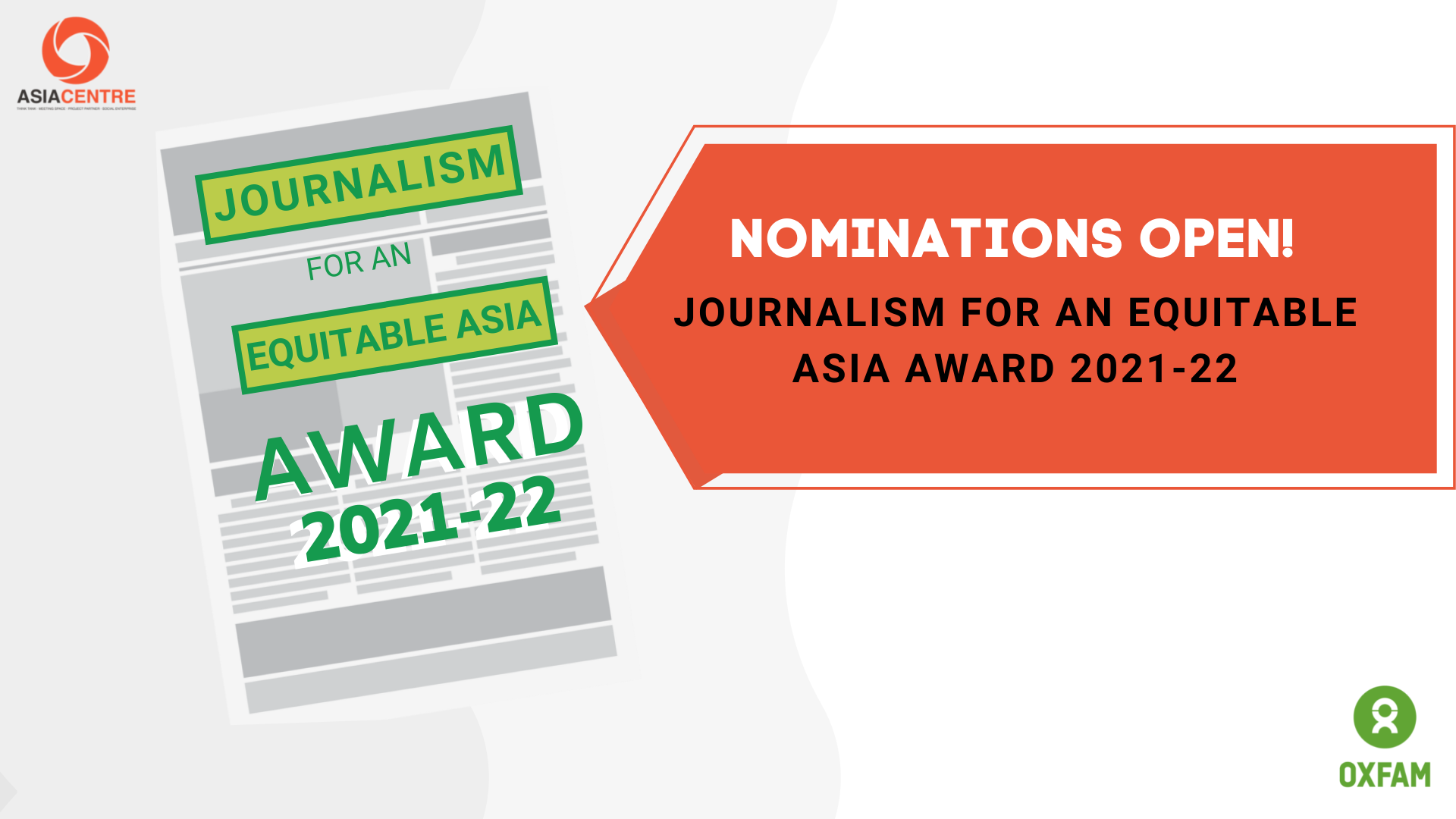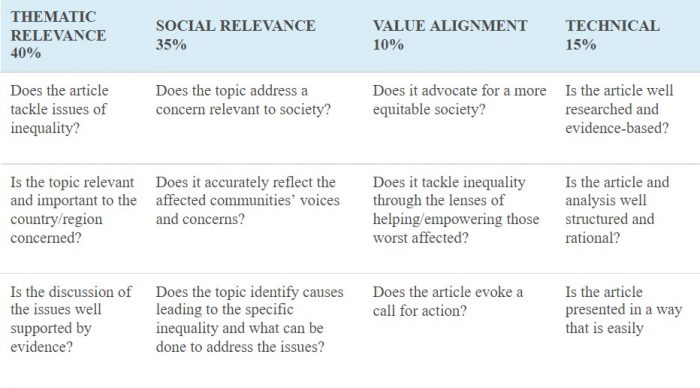
- This event has passed.
Nominations Open: 2021-2022 Journalism for an Equitable Asia Award
31 January 2022

As COVID-19 spread across Asia, harrowing scenes of overflowing hospitals and queues for funeral services in some of the region’s most populous countries shocked the world. However, even before the massive uptake in COVID-19 deaths in Asia in 2021, the 1.2 billion Asians struggling in or on the brink of poverty were grappling with an economic crisis that was wreaking havoc on their lives. Lockdowns and economic stagnation destroyed livelihoods across Asia, widening the cracks in an already unequal system, leaving the poorest and minorities at a greater risk of illness, death, and economic destitution. In November 2020, the World Bank estimated that a combination of coronavirus and increased economic inequality, pushed between 107 and 114 million more people into extreme poverty ($1.90) in Asia. Meanwhile, wealthy elites were able to protect their health and wealth, recovering and even increasing their fortunes. Asia’s inequality crisis and the COVID-19 crisis are thus inextricably linked whereby each has exacerbated and compounded the other, with the poorest suffering hunger, illness and destitution as a result.
In addition to the threats to their livelihoods, women, ethnic and gender minorities and those living in poverty also face the greatest risk from COVID-19 deaths. Their disadvantaged position leaves them unable to access basic hand-washing facilities, be able to socially distance or quarantine and afford lifesaving health services. In Asia, ethnic, religious and gender minorities also face high levels of poverty and discrimination that exclude them from accessing health and sanitation services. For women and girls, the pandemic has brought increased risks. Lockdowns and school closures increased women’s care-work responsibilities, reduced their income and impacted their access to healthcare facilities. Adolescent pregnancy and unsafe abortions have risen due to reduced maternal and reproductive health services during the crisis, and lack of access to healthcare services has put the lives of mothers and babies in jeopardy.
Meanwhile, wealthy elites can afford expensive private healthcare, and even use their privilege to skew limited public resources in their favour. Similarly, unequal access to COVID-19 vaccines among and within countries also means that some of the world’s poorest people have yet to receive a COVID-19 vaccine. Vulnerable and disadvantaged groups such as rural communities, indigenous groups, migrants, refugees and LGBTQI individuals are far less likely to have access to the vaccine.
Unequal access to COVID-19 vaccines has slowed down the ability of Asian countries to recover from the pandemic and see an economic turnaround. As millions of doses of the COVID-19 vaccine are administered each day, nearly half of the world’s population has received at least one shot of the vaccine. However, most of those who are fully vaccinated against the Coronavirus live in rich, developed countries and our world continues to be marred by staggering vaccine inequality. While some countries have vaccinated nearly half of all adults, in low income countries, only a small fraction of the population has received even a single dose.
Oxfam in Asia recognizes and values the role played by journalists in highlighting injustice, discrimination and exclusion to build a fairer more just and equitable Asia. Across the region, journalists have served as the voice of the people, held governments accountable and influenced changed. Since 2019, the annual Journalism for Equitable Asia award has been recognizing and encouraging journalists to write for a fairer Asia that works for all its people. In past years, the award recognized and encouraged evidence-based journalism highlighting economic, gender, climate-induced, and other inequalities in the region. It also created a unique forum for journalists, inequality experts, advocates and activists from across Asia to come together to discuss these issues.
The theme for the 2021-2022 Journalism for Equitable Asia award is ‘Inequality – Threat to Lives and Livelihoods’ and seeks to recognize journalism that has highlighted the impact of the COVID-19 pandemic on the lives and livelihoods of disadvantaged groups including women, ethnic, religious and gender minorities, migrant and informal workers. Eligible stories can cover a wide range of issues related to inequality including but not limited to access to healthcare, reproductive health services and COVID-19 vaccination, unequal access to education during the pandemic. Stories can also look at the impact of the pandemic on the social and economic conditions of women and girls.
The award will be launched online in several countries in South and Southeast Asia: Bangladesh, Nepal, India, Sri Lanka, Malaysia, Myanmar, Pakistan, Indonesia, Philippines, Thailand, Vietnam and Timor Leste with the award ceremony planned to be held in March 2022 in Bangkok. In case of travel and social distancing restrictions a virtual ceremony will be held.
Criteria for Nomination
Journalists are eligible for nomination if they meet the following criteria:
- Written English articles of minimum 650 words in length published in print or digital platform (Any written medium or public platform is eligible given the fulfillment of all the other criteria)
- Journalists writing two or more pieces published on the theme of health inequality from 1st January 2021 to 31st January 2022 will be eligible
- The nominated article(s) should cover how health inequality affects people from across Asia and/or their country during the COVID-19 pandemic. It can cover types of health inequality such as disparity of vaccine allocation, unaffordable costs of healthcare, preventable deaths. They may also discuss actions to address these inequalities to building a fairer Asia
Nomination Process
- Awards nominations can be submitted online here
- Journalists themselves, readers, media institutions or interested others such as civil society, media academics and health professionals may submit nominations.
- Each valid nomination must contain the name of the journalist, verifiable details of the published article(s) (links), their media affiliation(s), the contact information (Email, WhatsApp/line, phone) of the journalist.
- While they are required to submit proof of two published articles, they must also indicate which one they’d prefer to be considered for the award.
- In case online links are not available they can submit the scanned articles (translations) as pdf documents.
Timeline
Nominations Open is on 15 November 2021
Submission Deadline is on 31 January 2022
Award Ceremony is on 15 March 2022
Judging Panel
The Judging Panel will be made up of a panel of media and inequality experts, and will include representation from the Asia Centre, Oxfam International, and independent practitioners.
Judging Criteria

Awards
- The top 3 winners will receive cash awards and will be recognised at the Award Ceremony.
- The top 10 journalists* will be invited to participate in the Journalism for an Equitable Asia Award Ceremony to be held on 15 March 2022, Bangkok, Thailand.
- Merit certificates will be given to the journalists ranked from 11st to 15th places.
* For entries with more than one author, the authors can decide among themselves who would represent the entry at the Award Ceremony.
Details
- Date:
- 31 January 2022
- Event Category:
- Event
